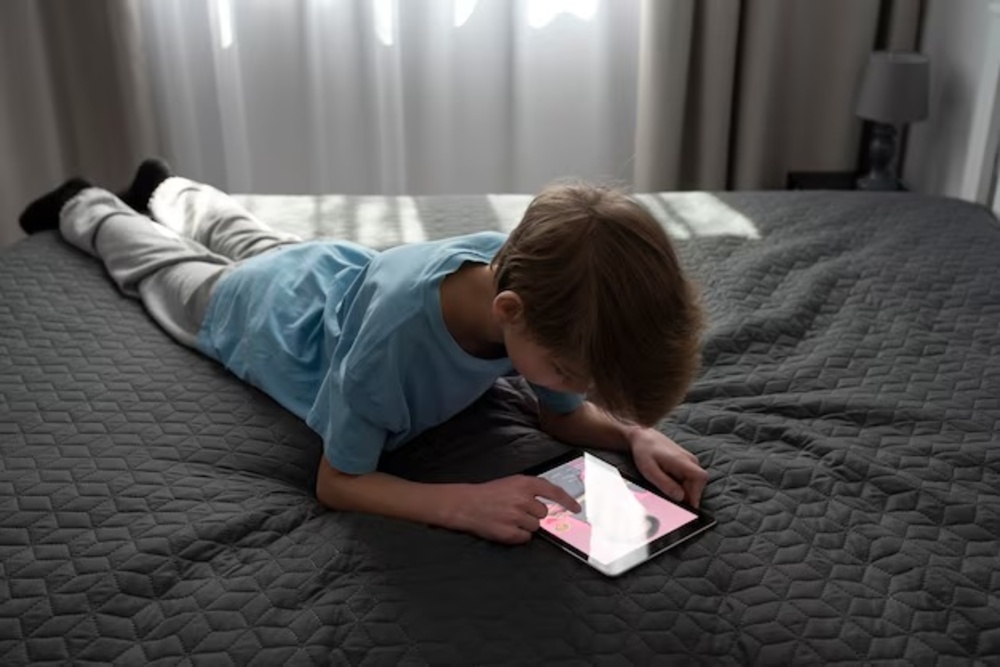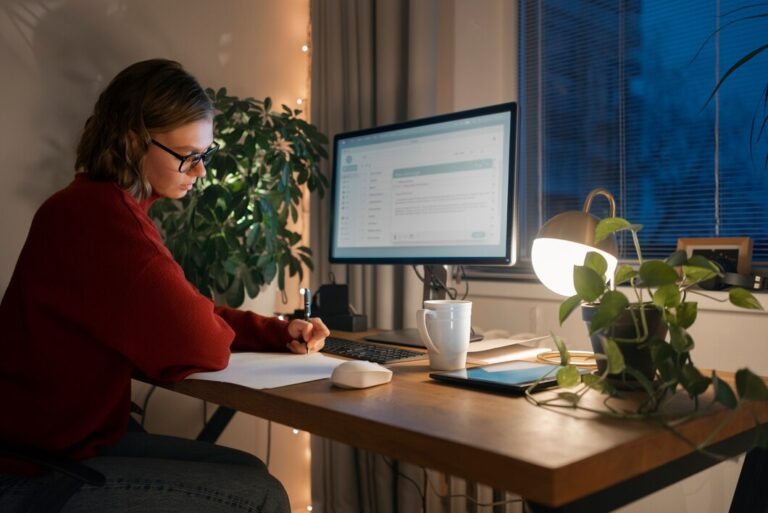
Our screens have become extensions of ourselves. From the moment we wake up to the minute we fall asleep, they are our constant companions. But have you ever stopped to wonder what this constant digital immersion is really doing to you? You might feel a nagging sense of fatigue, a subtle strain in your eyes, or a growing disconnect from the world around you. This isn’t just in your head. The way we interact with our devices is profoundly reshaping our health, happiness, and even our ability to think. This post will delve into the science behind excessive screen time, moving beyond the usual warnings to give you a clear, comprehensive understanding of its far-reaching effects and, most importantly, what you can do about it.
We live in a world that demands our constant attention, and our screens are the primary gateway. While they offer incredible benefits, the unmanaged deluge of information and stimulation comes at a cost. This article will explore the multifaceted impact of excessive screen time on your physical health, mental well-being, cognitive abilities, and social connections.
We will uncover the hidden mechanisms at play, from disrupted sleep cycles to the rewiring of your brain’s reward system. But this isn’t about fear-mongering; it’s about empowerment. By the end, you’ll have a practical toolkit to reclaim your time, attention, and overall well-being in a digital-first world.

The Invisible Toll: How Your Body Pays the Price for Screens
When we think of screen time’s negative effects, we often jump to mental fatigue. But the physical consequences are just as significant and can have long-lasting impacts on your health. It’s a silent erosion of your physical well-being, happening one scroll at a time. The sedentary nature of most screen-based activities is the most obvious culprit, directly contributing to a host of health issues.
Prolonged sitting, whether at a desk or on the couch, is now famously dubbed “the new smoking.” It’s linked to an increased risk of obesity, heart disease, type 2 diabetes, and even certain types of cancer. When you’re engrossed in a screen, you’re not moving.
This lack of physical activity slows your metabolism and impairs your body’s ability to regulate blood sugar and blood pressure. But the problem goes deeper. Have you ever noticed a dull ache in your neck or a tightness in your shoulders after a long day of work? This is often referred to as “tech neck,” a repetitive strain injury caused by hunching over laptops and smartphones. This poor posture doesn’t just cause temporary pain; over time, it can lead to chronic spinal issues and muscular imbalances that are difficult to correct.
Then there’s the direct impact on your eyes. Digital Eye Strain (DES) is a collection of eye and vision-related problems that result from prolonged computer, tablet, e-reader, and cell phone use. Symptoms include dry eyes, headaches, blurred vision, and neck and shoulder pain. The high-energy blue light emitted by our screens is a primary contributor. It penetrates deep into the eye, and cumulative exposure can potentially damage retinal cells and is linked to an increased risk of age-related macular degeneration. It’s a modern affliction for a modern habit, and with our screen usage climbing, it’s becoming a public health concern.
Key Physical Impacts:
- Sedentary Lifestyle Risks: Increased likelihood of obesity, cardiovascular disease, and metabolic syndrome. Think of every hour spent sitting as a direct deposit into a future health problem account.
- Musculoskeletal Issues: “Tech neck,” chronic back pain, and repetitive strain injuries in the wrists and hands from typing and scrolling.
- Digital Eye Strain: Headaches, dry eyes, blurred vision, and potential long-term retinal damage from blue light exposure. This is more than just feeling tired; it’s a physical strain on one of your most vital senses.
Your Brain on Screens: The Mental and Emotional Fallout
Beyond the physical, the most profound impact of excessive screen time is on our mental and emotional landscape. It subtly rewires our brains, alters our moods, and can exacerbate underlying mental health conditions. If you’ve ever felt more anxious, irritable, or unable to focus after a long session of scrolling, you’re experiencing this firsthand.
One of the most significant mechanisms at play is the disruption of our brain’s reward system. Social media platforms, games, and news feeds are designed to be addictive. They leverage a psychological principle called a variable reward schedule, the same principle that makes slot machines so compelling.
Each notification, like, or new piece of content provides a small hit of dopamine, the “feel-good” neurotransmitter. Over time, your brain starts to crave these frequent, easy hits, making it harder to find satisfaction and pleasure in less stimulating, real-world activities. This can lead to a state of chronic under-stimulation and dissatisfaction, a perfect breeding ground for anxiety and depression.
Furthermore, the very nature of the content we consume can be detrimental. The curated, picture-perfect lives displayed on social media often lead to social comparison, where we judge our own lives against these unrealistic standards. Studies have consistently shown a strong correlation between high levels of social media use and increased feelings of loneliness, envy, and lower self-esteem.
Your brain processes this constant stream of “perfect” lives as a reflection of your own inadequacy, even when you logically know it’s not real. It’s an emotional marathon with no finish line. The constant connectivity also blurs the line between work and rest, leading to chronic stress and burnout as we feel we must always be “on” and available.
A Deeper Look at the Mental Effects:
- Dopamine Dysregulation: The constant pings and notifications create a dependency on digital rewards, making everyday life feel less interesting and contributing to addiction-like behaviors.
- Anxiety & Stress: The pressure to be constantly available and responsive, coupled with exposure to negative news cycles (“doomscrolling”), significantly elevates stress and anxiety levels.
- Depression & Loneliness: Increased social comparison and a feeling of “fear of missing out” (FOMO) are directly linked to higher rates of depression. Paradoxically, the more “connected” we are online, the more isolated we can feel in reality.
The Sleep Thief: How Screen Time Hijacks Your Rest
Sleep is the cornerstone of good health, yet it’s one of the first things to be sacrificed at the altar of our screens. The relationship between excessive screen time and poor sleep is one of the most well-documented and harmful aspects of our digital lives. It’s not just about staying up late to watch one more episode; the very light from your screen actively sabotages your body’s ability to sleep.
The primary culprit is the blue light emitted from the screens of our phones, tablets, and computers. This specific wavelength of light is particularly effective at suppressing the production of melatonin, the hormone that regulates our sleep-wake cycle.
Your brain interprets this blue light as daylight, tricking it into thinking it needs to stay awake and alert. Using screens in the evening, especially within two hours of bedtime, can delay the onset of sleep, reduce the amount of restorative REM sleep you get, and leave you feeling groggy and unrested in the morning.
But it’s not just a biological issue. The content we consume before bed also plays a crucial role. Engaging with stimulating or emotionally charged content—like checking work emails, scrolling through a heated social media debate, or watching a suspenseful thriller—keeps your mind racing.
This psychological stimulation is the opposite of what you need to wind down. It activates your sympathetic nervous system (the “fight or flight” response), increasing your heart rate and alertness, making it physically harder to relax and drift off to sleep. This combination of biological disruption and psychological stimulation is a potent recipe for insomnia and chronic sleep deprivation.
Tweetable Quote: “Trading sleep for screen time is like taking out a high-interest loan on your health. The debt always comes due.”
Thinking in a Digital Haze: Cognitive Decline and the Loss of Deep Work
Are you finding it harder to concentrate on a single task for an extended period? Do you feel like your memory isn’t as sharp as it used to be? This isn’t just a sign of aging; it’s a direct consequence of how our digital habits are reshaping our cognitive functions. Excessive screen time is eroding our ability to engage in deep work—the state of focused concentration that drives high-quality thinking and creativity.
Our brains are being rewired for distraction. The constant multitasking we engage in—switching between emails, messages, and different browser tabs—trains our brains to prefer rapid shifts in focus over sustained attention. This creates what some neuroscientists call “cognitive switching penalties.”
Every time you switch tasks, your brain has to reorient itself, which consumes mental energy and reduces your overall efficiency. Over time, this constant switching degrades your ability to filter out irrelevant information and stay focused on the task at hand. Your attention becomes a scattered resource, rather than a focused beam.
This has a profound impact on memory and learning. The process of moving information from your short-term to your long-term memory requires deep, focused attention. When you’re constantly distracted, this consolidation process is interrupted. You might read an entire article online and retain almost none of it because your attention was fragmented.
This is why you can scroll for an hour but not remember a single thing you saw. We are becoming excellent at processing vast amounts of superficial information but are losing the ability to deeply engage with and remember the knowledge that truly matters. It’s the difference between wading in a shallow puddle and diving into a deep ocean of thought.
The Connection Paradox: Eroding Social Skills and Real-World Relationships
Our devices promise to connect us, but they are increasingly creating a paradox where we feel more disconnected than ever. Excessive screen time is fundamentally altering the way we interact with one another, often replacing the richness of face-to-face communication with the shallow, curated interactions of the digital world. This shift has significant consequences for our social skills and the quality of our relationships.
Real-world communication is a complex dance of verbal and non-verbal cues. We learn to read body language, interpret tone of voice, and practice empathy by being physically present with others. When our primary mode of interaction becomes text-based, we lose this crucial dimension of communication. Nuance is lost, misunderstandings are common, and our ability to navigate the complexities of in-person social situations can atrophy.
Have you ever been in a room with a group of people who are all staring at their phones? This phenomenon, known as “phubbing” (phone snubbing), sends a clear message to those around us: our digital world is more important than our physical one. This behavior damages trust and intimacy in our closest relationships.
Furthermore, the convenience of digital interaction can lead us to avoid the potential messiness and vulnerability of real-life conversations. It’s easier to send a text than to have a difficult conversation in person. While efficient, this avoidance can weaken our relational “muscles,” making us less resilient and capable when faced with real-world social challenges.
The result is a decline in the quality and depth of our social connections. We may have hundreds of online “friends,” but feel a profound lack of genuine, supportive relationships, contributing to the epidemic of loneliness that plagues our modern society.
Actionable Framework: The “Digital Detox” Checklist
Ready to take back control? This isn’t about abandoning technology, but about using it intentionally.
- Schedule “Screen-Free” Time: Designate specific times of the day, like the first hour after waking and the last two hours before bed, as completely screen-free zones.
- Curate Your Digital Environment: Turn off all non-essential notifications. Unfollow accounts that make you feel bad about yourself. Be ruthless in eliminating digital noise.
- Practice Mindful Tech Use: Before picking up your phone, ask yourself: “What is my intention?” Use your device to accomplish a specific task, then put it away. Avoid mindless scrolling.
- Swap Digital for Analog: Replace a half-hour of scrolling with reading a physical book, going for a walk, or listening to a podcast (without looking at your phone).
- Use Technology to Manage Technology: Utilize apps and phone settings that track your screen time and allow you to set daily limits for specific applications.
- Prioritize In-Person Connection: Make a conscious effort to schedule face-to-face meetings, phone calls (not texts), and social activities that don’t revolve around screens.
Conclusion: Reclaiming Your Attention and Your Life
The glow of our screens is seductive, promising connection, entertainment, and endless information. Yet, as we’ve seen, this constant engagement comes at a steep price. Excessive screen time is not a benign habit; it is actively reshaping our physical health, rewiring our brains, stealing our sleep, dulling our minds, and weakening our most important relationships. The digital world is designed to capture and hold our attention for profit, but you have the power to decide where your focus goes.
The solution is not to discard technology and retreat from the modern world. It is to move from a state of mindless consumption to one of conscious, intentional engagement. By understanding the forces at play and implementing practical strategies, you can mitigate the negative effects and harness the true power of technology to serve your goals, not distract from them.
Start small. Choose one strategy from the checklist above and commit to it for a week. Notice how you feel. The journey back to a balanced life begins with a single, intentional step away from the screen and back toward yourself.
What will you do today to reclaim your attention?
Frequently Asked Questions
- How much screen time is considered excessive?
There is no single magic number, as the “right” amount of screen time can vary based on age, profession, and individual health. However, many experts suggest that for adults, more than two to three hours of recreational screen time per day is entering the excessive zone. The more critical question is about the quality of screen time. Is it actively contributing to your work, learning, and connection, or is it passive, mindless consumption that leaves you feeling drained? If your screen time is negatively impacting your sleep, work, mental health, or relationships, it is excessive for you. - Can excessive screen time cause permanent damage?
While many effects of excessive screen time, like mental fog and poor sleep, can be reversed with better habits, there are concerns about permanent damage. The most significant is the potential for long-term retinal damage from cumulative blue light exposure, which could increase the risk of age-related macular degeneration. Similarly, chronic poor posture from “tech neck” can lead to long-term spinal and musculoskeletal issues that require significant intervention to correct. It’s crucial to address these habits early. - What are the best ways to reduce the impact of excessive screen time if my job requires it?
This is a common challenge. The key is to optimize your screen time at work and maximize your time away from it. During work, use the 20-20-20 rule: every 20 minutes, look at something 20 feet away for at least 20 seconds to reduce eye strain. Ensure your workstation is ergonomically sound to prevent posture problems. Take frequent breaks to stand up, stretch, and walk around. Most importantly, create a hard boundary at the end of the workday. Avoid checking work emails or messages in the evening to allow your brain to fully disengage and recover. - Does “night mode” or using blue light filters actually help with sleep?
Yes, they can help, but they are not a complete solution. Features like “Night Shift” on iPhones or f.lux for computers reduce the amount of blue light emitted by your screen, which can lessen the suppressive effect on melatonin production. However, they don’t eliminate it entirely. Furthermore, they do nothing to address the psychological stimulation of engaging with content before bed. Using a blue light filter is a good harm-reduction strategy, but the best practice remains to put all screens away at least one to two hours before you plan to sleep.






